Experiential Learning During a Pandemic: A Closer Look at 6 Courses
Throughout the fall semester, RWU students and professors found fun and experiential ways to keep learning hands-on, both in-person and at a distance
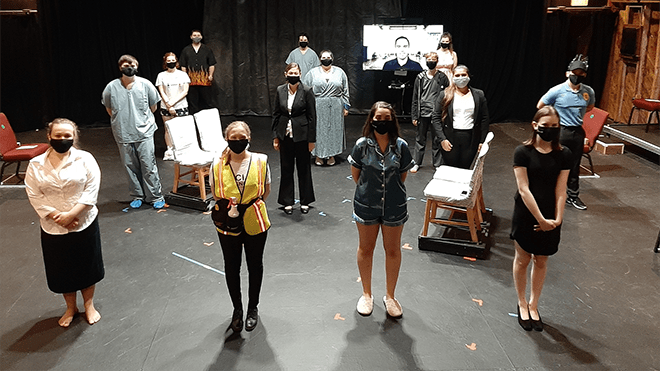
COVID-19 protocols brought many changes to RWU's campuses this fall, yet the University's signature commitment to hands-on, community-engaged education remains as strong as ever.
We talked with professors and students across schools and departments about the ways this semester's necessary changes brought opportunities for innovation, and the ways that collaboration, connection, and creativity have remained central to the RWU experience.
Farm Field Trips Connect Soil to Society
Professor: Loren Byrne, Professor of Biology and Environmental Science
Course: BIO/NATSC-375 Soil Ecology
It was a warm and sunny October day as students in Professor of Biology and Environmental Science Loren Byrne’s soil ecology class toured Frerichs Farm in Warren, RI. The wide open fields and fresh fall air set the scene for straightforward social distancing, allowing students a perfect opportunity to take a field trip to connect with the local community during the COVID-19 pandemic.
Exploring everything from crops to compost, the students heard from David Frerich, the farm's owner since 1977.
“I like to have students connect to the community and bigger questions of management and overall sustainability, for larger environmental context. We don’t just look at the details of the soil, but how they connect to society,” said Byrne.
Frerich shared his land management practices and explained how they benefit soil microbes, animals, and plant life. His passion for preserving open space evident in his words, along with his love for his land.
“David Frerich told us the price he could get for selling the land for development. We heard his commitment to something more than money: appreciating the property's value as green space. The students appreciated hearing from somebody who is so dedicated to managing the land and keeping it green,” said Byrne.
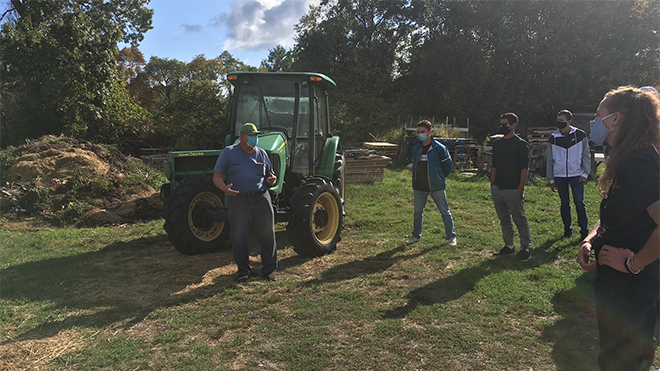
Next, the students visited neighboring Bettencourt Farm. This 17-acre parcel of open land, farmed for three generations until 2007, is the focus of a local land-use controversy. An LLC is proposing to build twelve houses and two four-story apartment buildings on the land, sparking local concern and debate over land use.
What could be done with the farmland if it was not developed? Could it be an outdoor school? Would people support its conservation because of the habitat it provides? Students discussed these questions and more, applying their sustainability studies to a real-world local dilemma.
“Professor Byrne made a good effort to tie the topics we were learning in class to local issues. It was nice to see local farms instead of just reading articles about people rejuvenating land,” said Matthew Gallup, a senior Environmental Science major.
Market Research for Real-World Clients
Professor: Edward Gonsalves, Adjunct Professor
Course: MRKT.305 Marketing Research
Adjunct Professor Edward Gonsalves’ market research students are helping real-world clients grow their businesses.
Twelve Guns Brewing, a small craft brewery on Metacom Avenue, right down the street from RWU’s Bristol Campus, wants information on expanding their business outside of the East Bay. Golf Channel, a sports television network, is looking to know more about how golf teams book and use their services. Dynamic Green Products, which has a line of bio-based lubricants, cleaners, and absorbents, and Riverzedge Arts, a nonprofit that teaches art, design and critical thinking to Rhode Island youth, are also seeking help.
That’s where the students come in. Three to four small groups of students were matched with each client, starting in September. Throughout the semester, the students and clients met virtually to share their needs and progress. Students created surveys and have been collecting and analyzing data to prepare final, formal reports to present to their clients.
"This project has been a great opportunity to be able to gain experience working for a client. And for that reason, I think it will help my career because it is a taste of what I would be doing as a marketer: getting a sense of the client’s goals, designing something that meets their needs, and collaborating with them until they’re happy with the final product," said senior Marketing and Management double major Emily Kiehl.
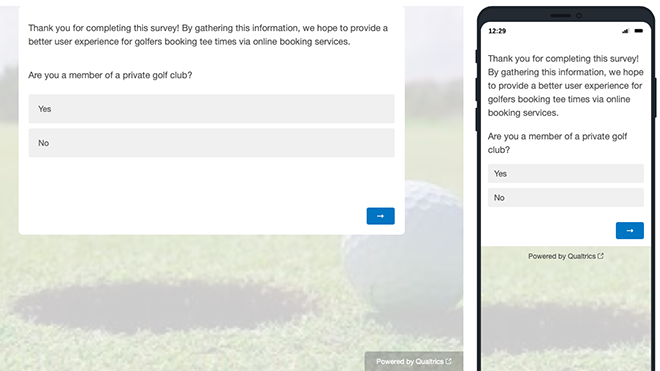
Clients offered direct feedback to the students, sharing their perspectives informed by years of experience. The students brought fresh eyes and new perspectives, allowing clients to improve their business practices and expand their understanding of their work.
“What has been great is the students are bringing new perspectives into the surveys compared to what we did,” said Rachel Anderson, marketing manager at Golf Channel. “We’ve been doing a whole bunch of research on our own, but it was neat to have the four groups bring different questions that nobody on our team had asked. This gave our company the ability to ask a few additional questions.”
“The clients have learned things they didn’t know before that the students were able to provide for them, even before the surveys were implemented. So far it has been a really good experience for the clients and a really good experience for the students,” said Gonsalves.
Insta-tales: Ancient Myths Meet Modern Technology
Professor: Susan Pasquarelli, Professor of Literacy and English Education
Course: ENG 210: Myth, Fantasy, and Imagination
If mythological creatures and folklore heroes had Instagram, what would they post?
Professor of Literacy and English Education Susan Pasquarelli’s Mythology students are using their creativity to bring folklore and mythology to a modern platform through the Insta-tales Project. Students pick a theme and develop a series of 10 Instagram posts with a common thread to express their reflections and insights on a folktale, myth, fable, folklore, fairy tale, or even their own family lore.
“English departments are morphing around the country, and I think part of that is engaging either with traditionally literary culture in popular ways or engaging with popular culture from a Cultural Studies standpoint,” said Department of English Literature and Creative Writing Chair Margaret Case. “I’m so excited about this project, not only because of all those things but because it is really fun. It really has the students being so creative.”
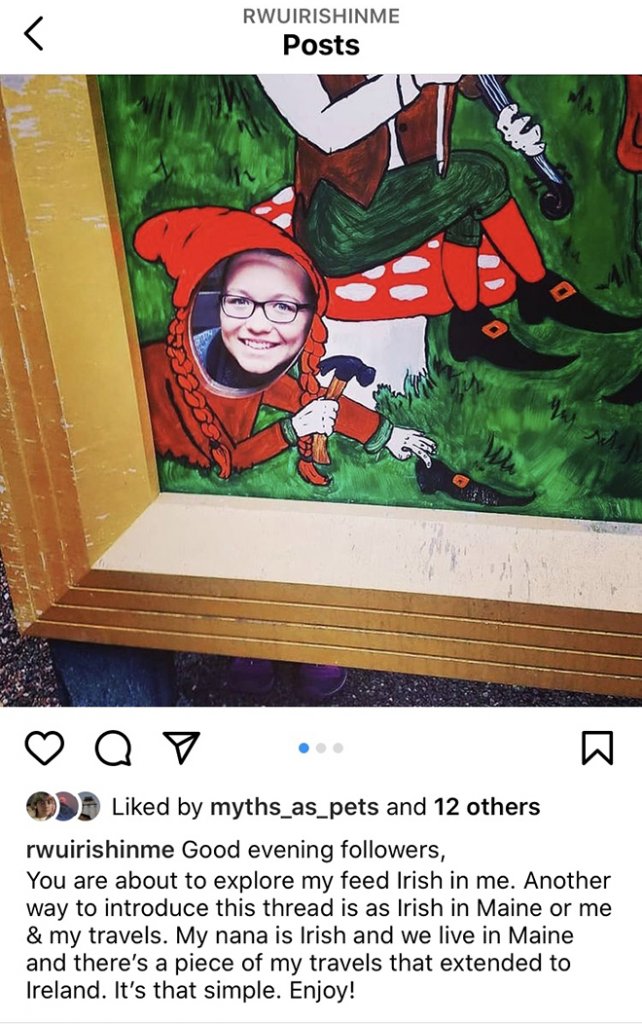
When RWU switched to remote education during the Spring 2020 semester, Pasquarelli had to get creative to find a way to facilitate discussion and feedback among her students. She discussed with her son her goal of providing students with an interactive audience for their work, and he suggested working with Instagram as a platform.
“Like many people of my generation, I’m very familiar with Instagram. It’s one of the largest social media platforms," said Libby Bennet, a Junior double major in English and Education. "When Dr. Pasquarelli assigned this assignment, I thought, ‘Wow, this is really cool, we’re using something we’re really familiar with for an academic purpose.’ Since I’m an Education major, I always look for ways to incorporate tools my students will be familiar with into their education.”
Each student created a new, private Instagram account to be shared with their classmates, professor, and select RWU community members. After drafting their posts and receiving feedback, they will share at least eight posts from November 17 through 24, and comment on at least two of their classmates’ posts each day.
“The idea is student choice, lots of engagement, and lots of repetition, discussion, and feedback,” said Pasquarelli. “Projects such as these have five to six practices of what we know as best practices for student engagement. One of my really important engagement principles is that the professor or the teacher is not arbiter of meaning, but rather we are constructing meaning together as a community.”
After witnessing the project’s success in the spring, Pasquarelli brought it back for the fall semester, and plans to continue it in the future.
“I’m not sure I would have done it if we had not had to really ratchet up the student engagement practices in the spring, and now I’m hooked. I’m hooked on big audiences for student work. I no longer want to be the only person who reads them,” said Pasquarelli.
Pasquarelli works in the Education Department, but was hired by Case to teach in the English Department as part of her commitment to bringing interdisciplinary perspectives to English electives. With many students working with both departments to pursue careers in English education, it was a natural fit.
“I love Dr. Pasquarelli and I’ve had her for several of my Education courses, so I wanted to see how she would teach an English course,” said Bennett. “She’s guided me so well through other challenging courses. I knew very little about Greek Mythology going into this. The way she structured this course allowed me to dive really deep into the different texts.”
‘Love in the Time of COVID’
Professor: Jeffrey Martin, Professor of Theater, Chair of the Department of Performing Arts
Production: 'Much Ado About Nothing' or: 'Love in the Time of COVID'
When faced with producing a play while adhering to COVID precautions, Professor of Theater Jeffrey Martin was not afraid of a challenge.
“Shakespeare seemed like a good place to go, because why not climb a high mountain?” he said.
He decided on an adaptation of "Much Ado About Nothing," incorporating and playing with the concept of COVID from start to finish. Instead of letting pandemic protocols get in the way of the performance, everyone involved – including actors, costume and set designers, and the tech director – used humor and care to make the most of the situation.
“We’ve adapted the police characters to be the ‘COVID Police.’ They do the scene changes and wipe down the furniture as it moves on and off. They have whistles, which they blow if characters go in for a kiss. At one point, we give actors a heart-shaped pillow with two hands on it, so they can hold hands through the pillow. At another point, we give them the little grabby things people use to extend their hands with dinosaur heads, so the dinosaurs can kiss,” said Martin.
The show opened on November 6 to a live audience of 13 RWU community members, and was streamed live for the greater community. It closed on November 14 after six performances.
Wearing masks and keeping six feet apart provided unconventional learning opportunities for student actors.
“Working less with facial expressions because half of your face is covered by a mask can be hard. Really going into the language using the words Shakespeare gave us was really interesting," said Jake Taylor, a senior Theatre major playing Benedict, one of the play’s leads. "For the first month, we just sat in rehearsal reading the script and analyzed every word, so we knew exactly what we were saying.”
“We were focusing on a lot of vocal work and over-exaggerated physicality, because we can’t show expressions with our mouth and nose," said junior Theatre and Criminal Justice double major Amanda Neff, who played Benedict’s love interest Beatrice. "Your entire body has to be in character. You can’t have one part of you that’s not, or else it won’t translate through the mask.”
When the semester began, it was uncertain whether colleges and universities would be able to sustain on-campus, in-person learning amid the pandemic. Martin and his students were not sure whether the show would go on. Now with the semester coming to an end and the performance complete, he looks back on the experience with satisfaction.
“The students have been terrific. They were really into it. It’s been a wonderful cast terms of their attitudes, their commitment, and the fun that they had,” said Martin.
At UC, In-Person Support for New Students Learning Remotely
Professor: Nancy Kubic, Adjunct Professor, University College
Course: 428.41 Crisis Intervention
Adjunct Professor Nancy Kubic is combining the in-person, classroom experience with remote education in ways that support new college students through the COVID-19 Pandemic at RWU’s University College.
“Some students are intimidated by solely virtual learning, particularly some of the new students who have not been in college before, some of them in their late 20s, 30s or even 40s,” said Kubic.
Having the option to come to the classroom and engage in real time with a professor, even over Zoom, has been key to their comfort and success this semester.
Students arrived in-person at UC’s Providence campus, and Kubic used Zoom to teach the class from her home. Pamela Pereira, Assistant Director of Retention Services at UC, was on-site to provide support to the students as needed, providing a complete classroom experience even with a virtual professor.
“Pam was so awesome. She couldn’t have been a better sport,” said Kubic. “Pam, and so many other people at the school, are right to support the students. This worked very well for this particular group. People liked the experience of real-time learning and engagement, even though I wasn’t physically there.”
The course material, Crisis Intervention, was all the more relevant due to the COVID-19 pandemic and other national and global events.
Kubic describes her class discussions as “tremendous,” and says she can’t take credit for her students’ dedication and eagerness to learn and engage.
“They were an awesome group that brought so much to the table. Quite a few of them were from our program for people who have been incarcerated. We had quite a few students from that population in that class and they were awesome. I made sure everyone had my number and knew how to get ahold of me if they needed to reach out. They were amazing, they were so smart and had so much to contribute.”
Engineering Senior Design Project Wins First Place
Professor: William Palm, Associate Professor of Engineering
Course: ENGR-492 Engineering Design II
Recent Engineering graduates Harrison Levesque ’20, Olivia Ryan ’20, Noah Hysong ’20, Matt Harkins ‘20, and Peter Gallagher ’20 took on the challenge of improving children’s bike safety for their Senior Design Project this past spring. This fall, they’re celebrating a first-place win at the American Society for Engineering Education’s Northeast Section (ASEE-NE) Conference, hosted virtually October 16-17.
Teams of senior RWU Engineering majors design, build, and test projects that apply their skills to real-world situations every year. Typically, each team presents their project at a local conference, but this spring most teams found their conferences cancelled or postponed due to the COVID-19 pandemic.
When Associate Professor of Engineering William Palm, bike safety team mentor, heard that the ASEE-NE conference was rescheduled for this fall, he made sure his former students would be able to attend, even though they had already graduated.
“I’m really glad we were able to present our work," Olivia Ryan said. "I know Dr. Palm had talked to Dean Potter about paying our conference fees to make sure we could still go and present it, even though we had graduated. So I’m very grateful and thankful for that.”
“It felt amazing to be able to present, to recognize all the hard work we had put into the project,” Harrison Levesque agreed. “Professor Palm helped us so much and we were all looking forward to seeing the project through. It felt good to know that our hard work didn’t go to waste.”
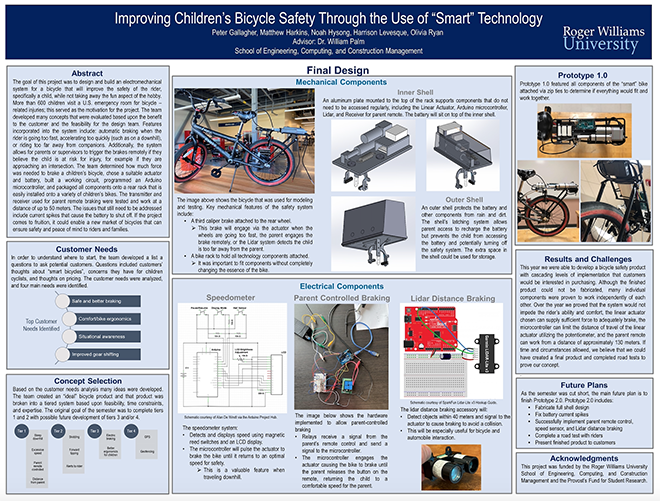
The team took Palm’s open-ended idea of improving children’s bicycle safety and created a prototype of a bicycle with smart technology, to automatically engage the brakes when the bicycle moves too quickly or approaches other objects. It also includes a remote braking system to allow adults to apply the brakes from afar.
The team was able to fabricate and test a winning concept despite the challenges of remote collaboration. Palm recognizes some advantages to this experience, and expects it will help the graduates as they transition into their careers.
“It’s good for the students to get this experience of working remotely with people, because when they are out working in their careers they will be doing that a lot. A lot of companies work with teams all over the world, so it is good for them to really experience it and feel it first-hand,” said Palm.
All four team members have already found success in their next steps, including Ryan’s acceptance into a graduate program at Brown University and Levesque’s employment at an aerospace company.
Levesque credits RWU’s Engineering department with helping him succeed, and had a message to share for those who supported him along the way.
“I want to give a shout-out to Dean Potter, who unfortunately passed away a few weeks back. I want to dedicate the project to him. He was my mentor and advisor. He was a great man and everyone is going to miss him. I want to thank him, the Engineering program, and Professor Palm for sticking with it and helping us push through the project even though we already graduated,” he said.
Faculty: Do you have a story of innovative teaching and learning during the pandemic? Email us at stories@rwu.edu